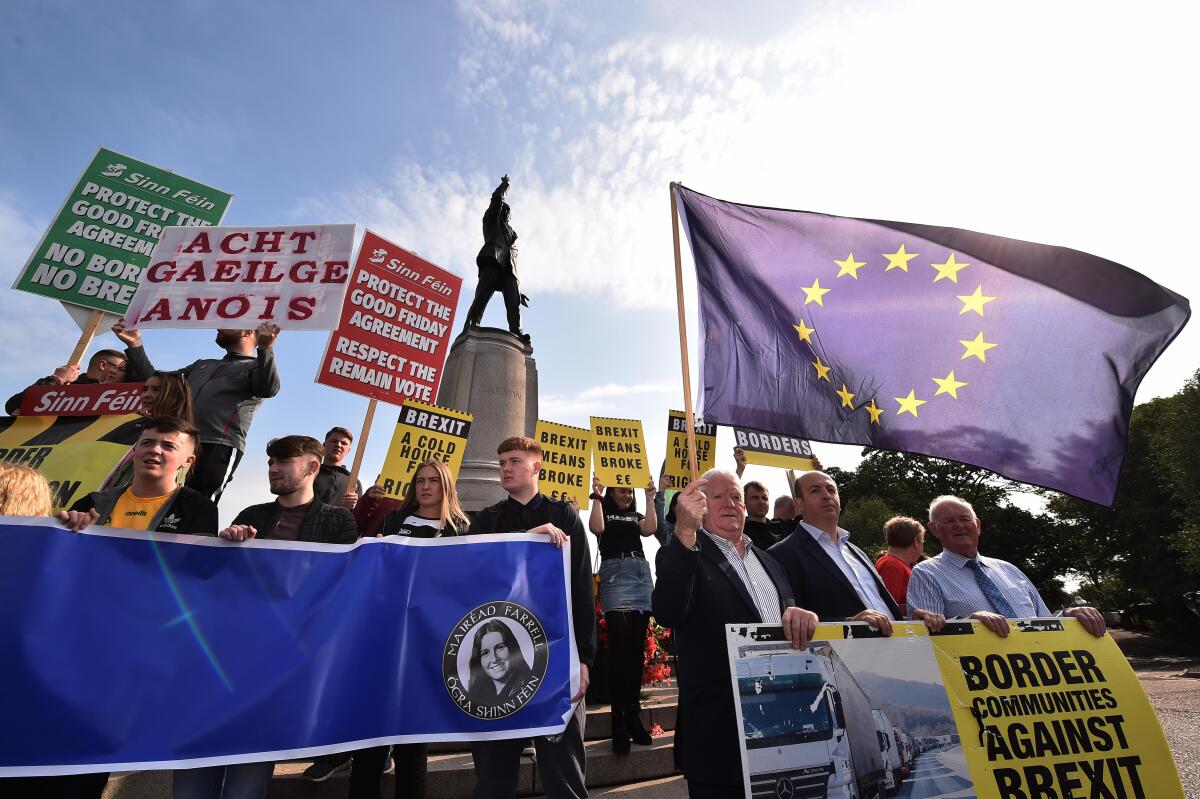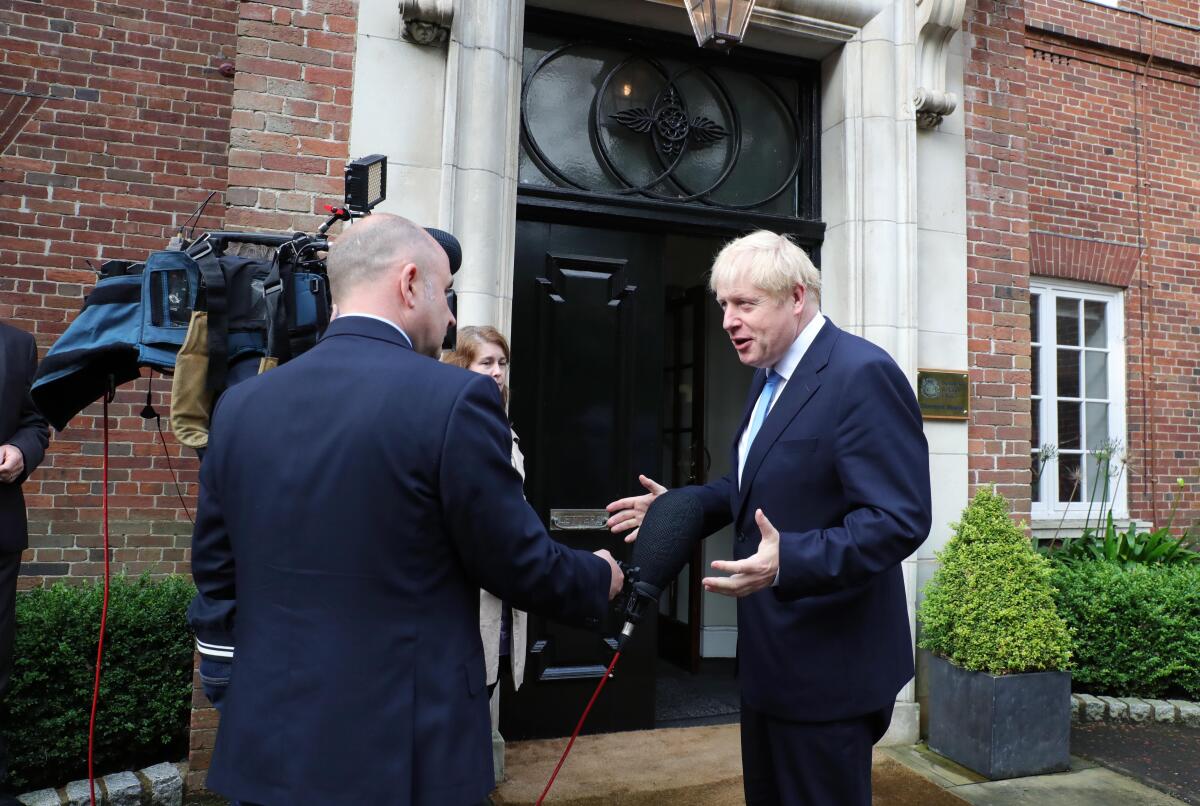First job for new leader of the United Kingdom: Keeping the kingdom united

- Share via
He was booed in Scotland. In Wales, a chicken submitted to his embrace, but politicians held him at arm’s length. And in Northern Ireland, there were rumblings of Irish unity — which could only come at the expense of its ties to the rest of the United Kingdom.
Boris Johnson, the new British prime minister, presides over a country consumed by Brexit, the messy and drawn-out departure from the European Union. But the early days of his tenure are also casting a harsh spotlight on another kind of split: the growing fault lines within the United Kingdom.
“It is highly unlikely that Boris will be the PM who oversees the breakup of Britain,” Michael Kenny, a University of Cambridge professor of public policy, wrote on a politics blog for the Center on Constitutional Change. “But he may well go down in history as the catalyst for its dissolution.”
Johnson, who took up his post on July 24, spent much of this week on a road trip to Scotland, Wales and Northern Ireland — which, together with England, make up the United Kingdom. The new prime minister likes to call the union the “awesome foursome.”
On his whistle-stop tour, he encountered sharp resistance to the idea of a no-deal Brexit — that is, leaving the European Union on schedule, less than three months from now, without an accord governing future relations with the bloc.
The irrepressible new leader has said that he hopes to strike a deal before the Oct. 31 deadline — but that he’s also ready to walk away with no accord. European officials, meanwhile, are warning that they won’t renegotiate the agreement reached with Johnson’s predecessor, Theresa May.
The British pound, often a barometer for Brexit sentiment, touched two-year lows this week as no-deal talk was bandied about by Johnson’s Cabinet ministers, who were largely handpicked for holding “do or die” Brexit views, in line with his.
Adding to Brexit jitters, Johnson’s government announced it was spending an additional $2.54 billion on emergency preparations for “crashing out” of the EU, such as stockpiling medicines.

The shows of disunity that Johnson encountered this week in his kingdom-wide tour were a far cry from the United Kingdom actually dissolving under the strain of Brexit. But there are plenty of sardonic nods to the spirit of divisiveness he has inspired. A former British prime minister, Gordon Brown, recently observed that Johnson could make history as “the first prime minister of England” — that is, not the full United Kingdom.
Since he assumed office, Johnson hasn’t yet made a visit to Brussels, where the EU is headquartered, saying he awaits signals of willingness to renegotiate. But home ground proved hardly more welcoming.
In Edinburgh, Scotland’s capital, protesters booed as he arrived for talks with Scotland’s first minister, Nicola Sturgeon, at her official residence. Sturgeon told him in no uncertain terms that a no-deal Brexit would galvanize support for another Scottish independence referendum, which she backs and he opposes.
She told the BBC afterward it was clear to her that Johnson’s government had embarked on a “dangerous” path.
Separatist sentiment in Scotland dates back centuries, and a 2014 referendum on breaking with the rest of Britain drew support of nearly 45% of the electorate — not enough to split off, but more than enough to rattle nerves in Westminster, seat of the British government. In the June 2016 Brexit referendum, Scots, unlike the U.K. as a whole, sided heavily with remaining in the European Union.
Wales, on the other hand, narrowly backed leaving the EU in the referendum. But it is heavily dependent on agriculture, and farmers are among those who are the most worried about the ramifications of a no-deal Brexit.
The prime minister, never one to shy from a photo op, visited a poultry farm in south Wales to demonstrate his support for farmers, gamely posing with a bird in his arms. But agricultural groups, including the main one representing Welsh lamb farmers, warned there could be unruly road-blocking protests and a forced mass slaughter of livestock herds if he pushes ahead with a no-deal Brexit and they are hit with tariffs.
The Welsh first minister, Mark Drakeford, told Johnson that crashing out of the EU would be “catastrophic” for Wales.
“The prime minister needs to think about the future of the United Kingdom in a genuinely serious way,” Drakeford told Britain’s Guardian newspaper. “Just a few more choruses of ‘Rule Britannia’ and an extra supply of Union Jacks is not going to cut it.”
And then Johnson was on to Northern Ireland, where the Brexit stakes may be higher than almost anywhere.
After decades of bloody sectarian conflict, a cornerstone of the 1998 Good Friday peace accord is an open border between Northern Ireland, which is part of the United Kingdom, and the Republic of Ireland, which is not. The 300-mile frontier is all but invisible. Trade flows freely, and people casually border-hop for jobs and shopping.
That status quo is threatened by Brexit. Johnson has demanded that the EU scrap the so-called backstop, an agreement that would preserve the “soft” border but could force all of the U.K. to remain in the EU’s customs union. That would mean adhering to some EU rules, which hard-line Brexiters say they cannot abide.
In Northern Ireland, the leader of the Irish nationalist party Sinn Fein, Mary Lou McDonald, said that in the event of a no-deal departure from the EU, she would push for a vote on uniting Ireland — that is, for Northern Ireland to leave the U.K. Writing on Twitter, she called Johnson a threat to a hard-forged peace.
“Bluster & bravado can’t mask the utterly destructive Brexit route he is taking,” she wrote. “He is on course to upend our peace & prosperity with his eyes wide open.”
Northern Ireland politics play a particular role in Johnson’s ability to keep his new job. The working majority of his Conservative Party in the British Parliament is made possible only by its alliance with the Democratic Unionist Party, or DUP, which, as its name suggests, supports remaining part of the U.K.
But other parties in Northern Ireland, particularly Sinn Fein, are disdainful of the DUP for doing the new British prime minister’s bidding on Brexit.
Johnson suggested he might be able to help repair a power-sharing agreement suspended two years ago amid infighting among Northern Ireland’s political parties. But among the quarreling parties, there was considerable consensus on one thing: Johnson was ill-equipped to bring them together.
After the meeting in Belfast, the deputy head of the Social Democratic and Labor Party, Nichola Mallon, said Johnson displayed a “limited understanding of the complexities and fragilities of this place.”
Dublin wasn’t on Johnson’s itinerary, although British leaders usually move quickly to establish a rapport with the Republic of Ireland.
Johnson waited almost a week to telephone his Irish counterpart, Leo Varadkar, who crisply informed him that the EU, including Ireland, was “united in its view” that the Brexit accord could not be renegotiated.
More to Read
Sign up for Essential California
The most important California stories and recommendations in your inbox every morning.
You may occasionally receive promotional content from the Los Angeles Times.










